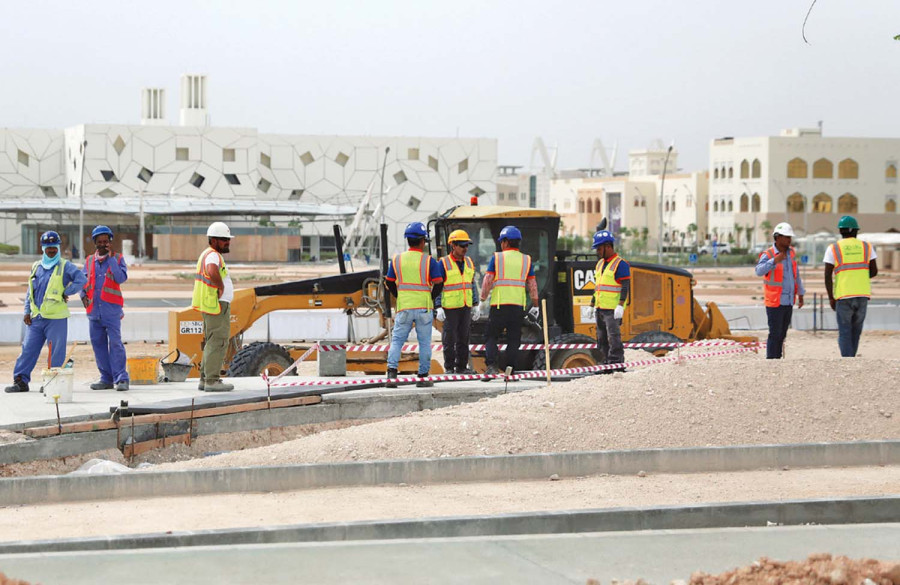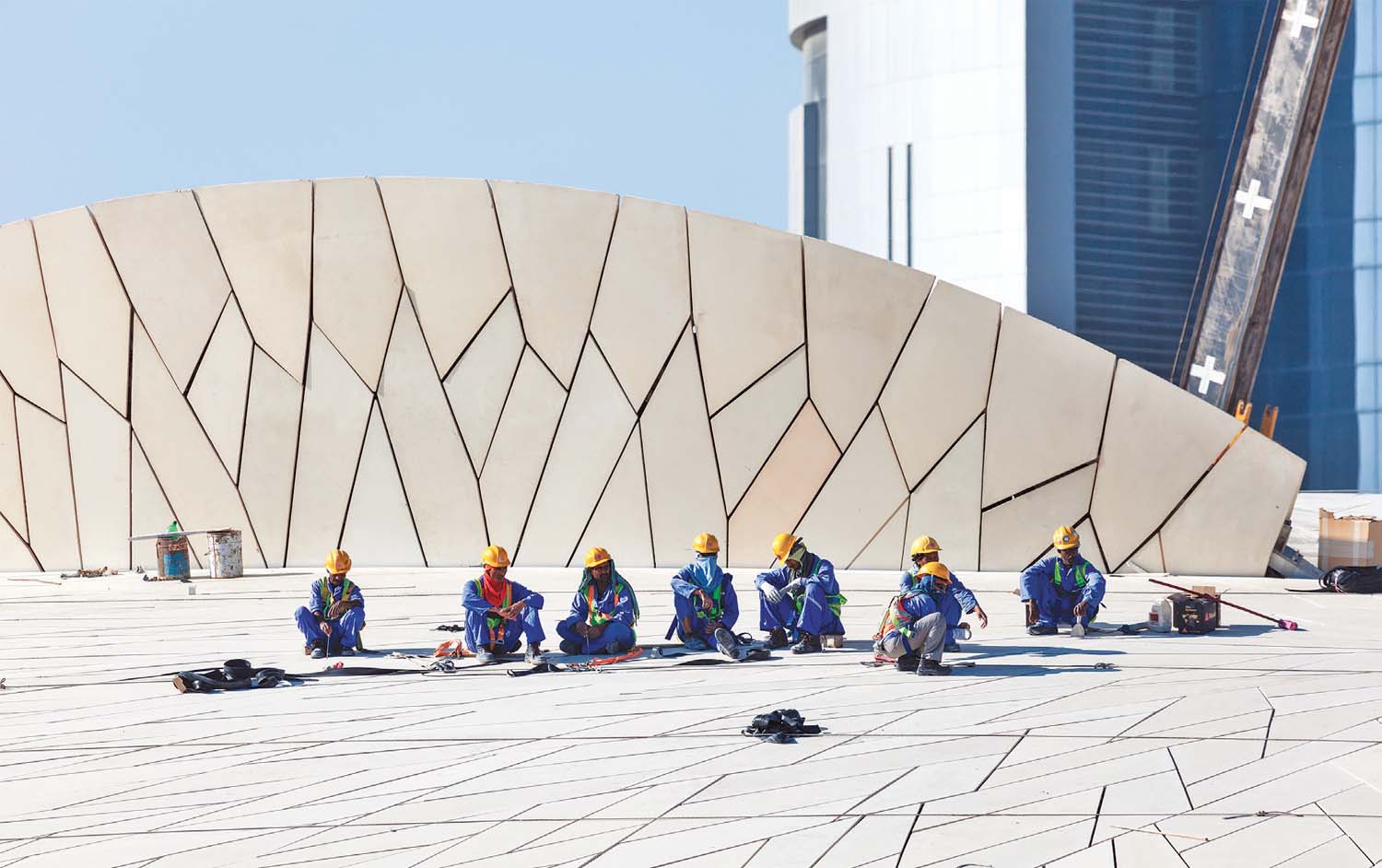Money
Qatar expels Nepali migrant workers for joining protest
The demonstrating workers were demanding their backpay, and they were sent home after being paid in full, rights activists say.
Pawan Pandey
Nearly five dozen Nepali workers have been deported from Qatar for allegedly joining a protest demanding their backpay, multiple sources privy to the matter said.
The expulsions come three months before the Gulf country hosts the planet's biggest sporting extravaganza, the FIFA World Cup.
Migrant rights groups said most of the demonstrating workers were Nepalis, and they were asking for their rightful salaries. A Nepali government official said the company which employed them closed two months ago, and they were sent home after they had been paid in full.
“Around 55 Nepali workers employed at the Al Bandary International Group were deported to Nepal on August 19,” Rameshwar Nepal, South Asia Director at Equidem Research, a United Kingdom-based human rights research organisation, told the Post.
He said that several of the expelled migrant workers were in touch with them. “They don’t want to speak publicly.”
According to Nepal, around 500 workers from Nepal, India, Bangladesh, Egypt and the Philippines had protested outside the company's office on August 14 saying they had not been paid for five to seven months.
“Security personnel arrived and took around 300 workers to a detention centre where they collected their employment details,” he said.
The Qatari government, which has come under international spotlight in the past for its treatment of migrant workers, confirmed to the Associated Press that some of the workers who took part in the August 14 protest had been detained, but gave no details whether they were subsequently expelled.
“The protesting Nepali workers had even moved the labour court. They received two months’ salaries,” said Nepal, quoting one of the returnees. “The company had assured the workers of full payment of their salaries soon, but they kept putting it off. The Qatari authorities paid the workers all their money before sending them back."
Strikes are illegal in Qatar.
“We have been informed by the Nepal Embassy in Doha that around 50 Nepalis were returned to Nepal after the Qatar government paid them the wages owed to them,” said Thaneshwar Bhusal, under-secretary at the Ministry of Labour, Employment and Social Security. “The company in which the Nepalis were employed was closed two months ago.”
Bhusal said the deportation process was done in a legal way. “They were not forcefully expelled.”
Video footage posted online showed some 60 workers angrily protesting on August 14 outside the Doha office of the Al Bandary International Group, a conglomerate with interests in construction, real estate, hotels, food service and other ventures, according to the Associated Press.
In a statement sent to the Associated Press on Sunday night, the Qatari government acknowledged that “a number of protesters were detained for breaching public safety laws.” It declined to offer any information about the arrests or any deportations, the US-based news agency said.
According to the Associated Press, the Qatari government said, “The company was already under investigation by the authorities for non-payment of wages before the incident. And now further action is being taken after a deadline to settle outstanding salary payments was missed.”

Rameshwar Nepal quoted one of the deported Nepali workers as telling him that Qatari officials had talked to them about their salaries on August 16, two days after their detention, and paid them their outstanding salaries on August 18.
“Some of the workers were handcuffed when they were sent to collect their belongings on August 17,” Nepal said, quoting the deported worker. “The Qatari authorities also fingerprinted and photographed them.”
On Friday, they were given their tickets and put on an Air Arabia flight.
“The action of the Qatari authorities is completely unacceptable,” said Nepal. “It is a fundamental right to carry out a peaceful protest demanding their rightful pay.”
Earlier in the month, hundreds of migrant workers in Qatar had gone on strike to protest against poor working conditions, unpaid and delayed wages, and threats of reduced wages, according to a report of Human Rights Watch published on August 8.
The human rights watchdog said despite introducing some labour reforms over the past year, Qatari authorities have failed to abolish the exploitative kafala sponsorship labour system that fuels abuses and grants employers excessive power over their employees. Migrant workers are still banned under Qatari law from joining unions and participating in strikes.
“The workers in Qatar are going on strike in a country that bans them from striking or joining unions, and against the backdrop of a labour system that leaves them vulnerable to abuse and exploitation,” Lama Fakih, acting Middle East director at Human Rights Watch, said in a statement issued on August 8. “Abusive labour practices that lead workers to take such a risk will continue until the Qatari government makes good on its promise to repeal the kafala system.”
In addition, the routine confiscation of workers’ passports by employers, debts incurred by migrant workers to pay for recruitment fees, and the prohibition on migrant workers joining unions and striking leaves workers vulnerable to abuse, the human rights watchdog said.
Reports have also surfaced of a strike in Shahaniyeh Municipality on August 4, 2019, with videos and images circulated on social media showing hundreds of workers demonstrating against unpaid and delayed wages.
One migrant worker shared a video of the protest on Facebook, saying that his company had not paid the workers for five months. A local resident confirmed the strike and the protesters’ wage demands to Human Rights Watch.
Since October 2017, when Qatar committed to align its laws and practices with international labour standards, the Qatari government has introduced several reforms aimed at improving conditions for migrant workers.
They include setting a temporary minimum wage, introducing a law for domestic workers, setting up new dispute resolution committees, mandating the establishment of joint labour committees at companies employing more than 30 workers for collective bargaining, establishing a workers’ support and insurance fund, and ending the requirement for most workers to get an exit permit through their employer to leave the country.
In March 2020, the oil-rich nation was accused of detaining dozens of migrant workers citing Covid-19 tests and illegally expelling them.
More than 400 Nepali workers were deported after local authorities accused them of violating the Qatari government's measures to contain the virus.
Despite Qatar being one of the top labour destinations for Nepali workers, issues of labour exploitation there have been making international headlines over the years.
While 76,822 Nepalis received labour permits to work in Qatar, 108,191 renewed them in the last fiscal year ended mid-July, according to the Department of Foreign Employment.
Qatar has a population of about 2.8 million, including 1.7 million foreign labourers, according to Amnesty International.
In preparation to host the soccer championship, the first in the Middle East, Doha launched a modernisation project that included expanding its main airport and public transportation systems and building stadiums and hotels.
Last year, Qatar made a policy to send home thousands of migrant workers who built the stadiums and other infrastructure for the World Cup by placing them on five months' unpaid leave so they would not be visible during the tournament.
In a bid to accommodate the expected influx of players, supporters and the media, Qatar's hotel industry has added 26,000 rooms, and it needs hordes of workers to run them.
Nepal has allowed Qatar to hire Nepali workers for a temporary period in the service sector. The number of workers to be hired, however, has not been decided.




 14.24°C Kathmandu
14.24°C Kathmandu















